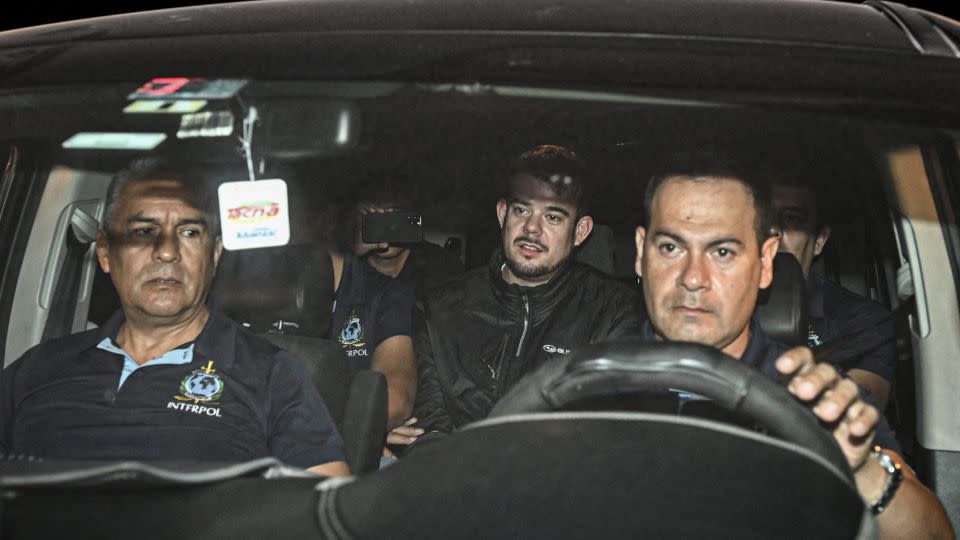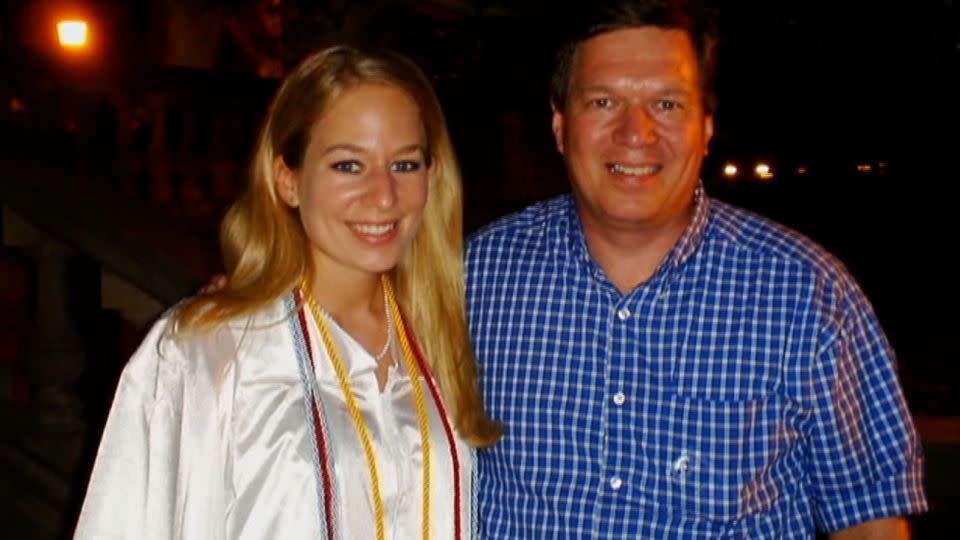Why Joran van der Sloot might not be prosecuted for Natalee Holloway’s murder, despite admitting he killed her
- Oops!Something went wrong.Please try again later.
The decision by US prosecutors to offer Joran van der Sloot a plea agreement on charges of extortion and wire fraud led to his confession in the 2005 killing of Natalee Holloway in Aruba – and although he might not be prosecuted for the Alabama teen’s death, legal experts say the deal was vital in helping the teen’s family finally achieve closure.
The 36-year-old’s confession was made public shortly after he pleaded guilty in federal court Wednesday to extorting and defrauding Holloway’s family in a plot to sell information about the whereabouts of Holloway’s remains in exchange for $250,000.
“It’s over. Joran van der Sloot is no longer the suspect in my daughter’s murder. He is the killer,” Beth Holloway said Wednesday.
But it’s unclear whether van der Sloot, a Dutch national, can face prosecution for the killing, as the 12-year statute of limitations for homicide in Aruba has long passed, and the US, which has no statute of limitations for homicide, does not have jurisdiction over the criminal investigation in the Caribbean island nation.
In a statement to CNN on Thursday, a spokesperson for the Aruba Public Prosecutor’s Office did not rule out the possibility that van der Sloot could face new legal action in Aruba after his confession. When asked whether or why the statute of limitations might not apply to van der Sloot, the spokesperson said the question “cannot be answered unequivocally.”
“The Public Prosecutor’s Office will reiterate once more that the Holloway case remains an open investigation in Aruba,” spokesperson Ann Angela told CNN in an email.
In light of van der Sloot’s confession, Aruban authorities “have requested the U.S. Department of Justice for official court documents and transcripts and all documents related to the investigation, which we will review before deciding on the procedural steps to be taken.”
“It depends on several factors within the investigation,” Angela said. “Bear in mind also that we don’t know yet what is in the official court documents and documents related to the investigation. Therefore there is no simple yes or no at this moment.”
As part of his US plea deal, van der Sloot agreed to reveal everything he knew about the circumstances surrounding Holloway’s disappearance – a procedure known as a proffer, whereby a defendant offers prosecutors information they know about a crime.
It’s likely “one of the things (prosecutors) wanted to secure for the victim’s family and loved ones is a confession from him that he actually did the crime to give them closure,” said Ben Grunwald, a professor at the Duke University School of Law.
According to the plea agreement, van der Sloot will serve his 20-year prison sentence for extortion and wire fraud concurrently with the 28-year sentence he’s already serving in Peru for the 2010 murder of Stephany Flores, a Peruvian woman. Officials in Peru allowed his temporary release to the US in June to face the extortion and wire fraud charges.
It’s typical in the plea-bargaining process for defendants to get something in return for admitting guilt in a crime, which can come in the form of a reduced sentence recommendation or a dismissed charge – which a judge has to approve. In van der Sloot’s case, it’s likely he was spared a consecutive sentence, which would require him to be sent back to the US to serve 20 years in federal prison after his time served in Peru, according to Grunwald.
“I imagine he didn’t give up the confession for free,” Grunwald said. “I was a little surprised to see he got the concurrent, so I thought that might be what he got in exchange for the confession.”
Van der Sloot was also convicted of trafficking cocaine into his prison in 2021 and sentenced to an additional 18 years in Peru, according to a sentencing memorandum. But Peruvian law bars prison sentences from exceeding 35 years unless the defendant is given a life sentence, the document says.
That means van der Sloot is scheduled to be released from Peruvian prison in 2045 and likely won’t return to the US to serve time for the federal charges after serving both sentences together. At the time of his release, he would likely be deported to his country of citizenship, legal experts said.

Van der Sloot was long suspected in teen’s murder
Holloway was visiting Aruba, from Alabama, on a high school graduation trip when she vanished in May 2005. She was last seen leaving a nightclub with van der Sloot and two other men.
Local police arrested and released van der Sloot and brothers Deepak and Satish Kalpoe multiple times in connection with Holloway’s disappearance. Attorneys for the men maintained their innocence throughout the investigation.
In December 2007, the Aruban Public Prosecutor’s Office said none of the three would be charged and dropped the cases against them, citing insufficient evidence.
In a transcript of an interview with his attorney included in court documents filed Wednesday, van der Sloot said Holloway kneed him in the crotch after he tried “feeling her up,” and he responded by kicking her in the face and bludgeoning her with a cinder block. He then decided to “push her off” into the ocean, the transcript reads.
Holloway’s body was never found. In 2012, an Alabama judge signed an order declaring her legally dead.
At the sentencing, US District Court Judge Anna Manasco said the murders of Holloway and Flores prompted her decision to give van der Sloot a 20-year sentence. After reading van der Sloot’s proffer, Manasco also said Holloway’s body would never be found.

Holloway’s mother decided on validity of confession
One of the stipulations of van der Sloot’s plea deal is that Holloway’s mother would be consulted to make a determination on the “completeness, accuracy, and truthfulness of the information and evidence” he provided regarding her daughter, it says.
The agreement also bars US federal prosecutors from using “information or evidence” in van der Sloot’s proffer against him in the investigation, according to the document.
Prosecutors also agreed to acknowledge his “truthfulness” at his sentencing, noting it “provided closure to the Holloway family,” the document says.
It’s possible van der Sloot’s attorney advised him to take the plea deal rather than facing trial on the extortion and fraud charges due to the scope of evidence prosecutors had against him, which could have risked a greater prison sentence, said Hermann Walz, adjunct professor at John Jay College of Criminal Justice and a former assistant district attorney in New York.
Another consideration by prosecutors might have been sparing Holloway’s family from reliving her death during a trial, decades after her disappearance, Walz said.
In court on Wednesday, Manasco said she considered van der Sloot’s “brutal murder of Natalee Holloway” in her decision to accept the plea agreement.
“It’s really not a terrible decision for him and I’m confident they didn’t make this deal without talking to the family of Natalee Holloway,” Walz told CNN. “The family says, ‘It’s more important for us to just know. We need to know to some degree, what really happened?’ And now they have that. And that matters to people sometimes – the family just knowing.”
CNN’s Holly Yan, Devon M. Sayers and Aaron Cooper contributed to this report.
For more CNN news and newsletters create an account at CNN.com

